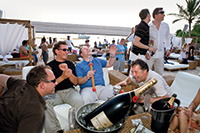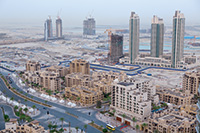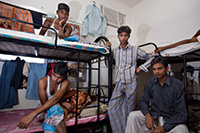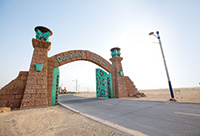Not long ago, Dubai emerged as a symbol of crazed civic ambition, a once-quiet desert burg suddenly superheated by cheap capital. That's over.
http://www.fastcompany.com/magazine/138/exodus.html
Deserts have a way of reclaiming whatever is built upon them. In the case of Dubai, on the Persian Gulf, the global financial implosion has sent that process into overdrive. After six years of frenzied expansion, during which the emirate's population grew at 7% annually and nearly $600 billion went into construction (the world's tallest building! the world's largest shopping mall! the biggest man-made island! an indoor ski resort!), reality has come rushing into view.
"They have no oil, no culture, no history," says Peter Harradine, a prominent landscape architect in Dubai and manager of Harradine Golf. "So what they have been able to produce is a miracle." Or was it a mirage? Today, an estimated 50% of the slated developments are frozen or canceled. Banks have stopped lending. Housing prices fell 41% in the first quarter of 2009 and are expected to drop to preboom levels. The stock market has plunged 70% from its peak. And people across the socioeconomic spectrum are being laid off -- and fleeing -- in droves. But even fleeing is harder than it sounds: When foreigners, who once made up perhaps 80% of Dubai's 1.7 million residents, lose their jobs, their work visas are rescinded and they generally have 30 days to pay their debts and leave. Those who fail to pay risk debtor's prison. And debt here is now as deep and ubiquitous as the sand itself.
The wealthy, like the Emiratis, remain well cared for. Designer Roberto Cavalli, asked why he spent $30 million on his new Cavalli Club during a financial crisis, replied, "What financial crisis?" These pages may remind him.
Road to Nowhere
Dubai's expansion was as ambitious as it was improbable. Dubailand, a $64 billion mixed-use development initially planned at 107 square miles, was to be the world's largest collection of theme parks, shops, residences, and hotels. For now, though, its roller coasters, life-size dinosaurs, snowy mountainscape, and polar bears will remain a fantasy, one of the gaudier casualties of the economic downturn. While formal cancellations are rare in Dubai, a number of other projects have been delayed or scuttled, including an underwater hotel; a Tiger Woods golf course; a residential community set among full-scale replicas of the Seven Wonders of the World; a rotating skyscraper; and a beach designed by Versace, complete with chilled sand.
Last Gasp
 PLASTIK BEACH CLUB, 30 MILES OUTSIDE OF DUBAI
PLASTIK BEACH CLUB, 30 MILES OUTSIDE OF DUBAI
With requisite hookah and a jeroboam of Champagne, a group of German businessmen celebrate their purchase of an Alaskan oil field at Plastik Beach Club, a playground touting itself as "exclusively for the filthy rich and aesthetically perfect." Public intoxication and displays of affection are jailable offenses in Dubai, but private clubs are quietly ignored by the authorities, often rendering them happy havens of vice. Plastik offers a helipad and a dock for its wealthy guests, many of them Russian; as the economy crumbles, they party on. One American expat says that while Dubai's promise has faded in the economic downturn, "people who dream of a better life dream of coming to Dubai. You can call it the American dream."
Frozen Desert
 THE VIEW NORTH, NEAR BURJ DUBAI
THE VIEW NORTH, NEAR BURJ DUBAI
Dubai was a modest trading settlement until the 1980s. Fueled by cheap credit, tax-free living, and limitless ambition, the city-state pushed into the desert and up to the sky, culminating in the frenetic growth of the past six years. Now, with cash scarce and many of Dubai's expats moving away, the cranes (a quarter of the world's supply) have quieted and the streets are all but empty. A resident from Ireland reflects that living in Dubai during the rush was "like being on a drug. Every six months, the city would morph into something completely new." Kayla, a South African, recalls, "Everyone was talking about how it couldn't go on like this. Then, all of a sudden, everything changed."
Ghost Workers
 SONAPUR LABOR CAMP, OUTSIDE OF DUBAI
SONAPUR LABOR CAMP, OUTSIDE OF DUBAI
Once Dubai's most valuable import, foreign laborers have become a liability to their former employers. Hundreds of thousands of them, mostly from South Asia, were drawn by the promise of plentiful work and money to send home to their families. Now that much of Dubai's construction has ground to a halt, many are being sent home; the number of migrant workers here has reportedly fallen by a third. Of those who remain, many are locked in labor disputes: They can't work, but can't leave. These jobless Bangladeshi men can't return home because, as frequently happens, their employers confiscated their visas, effectively leaving them shackled. Living four to a room in a labor camp, they haven't been paid in seven months. They say they live as "ghosts" in a "prison," unacknowledged and unknown.
--
Thanks for being part of "PoliticalForum" at Google Groups.
For options & help see http://groups.google.com/group/PoliticalForum
* Visit our other community at http://www.PoliticalForum.com/
* It's active and moderated. Register and vote in our polls.
* Read the latest breaking news, and more.

No comments:
Post a Comment